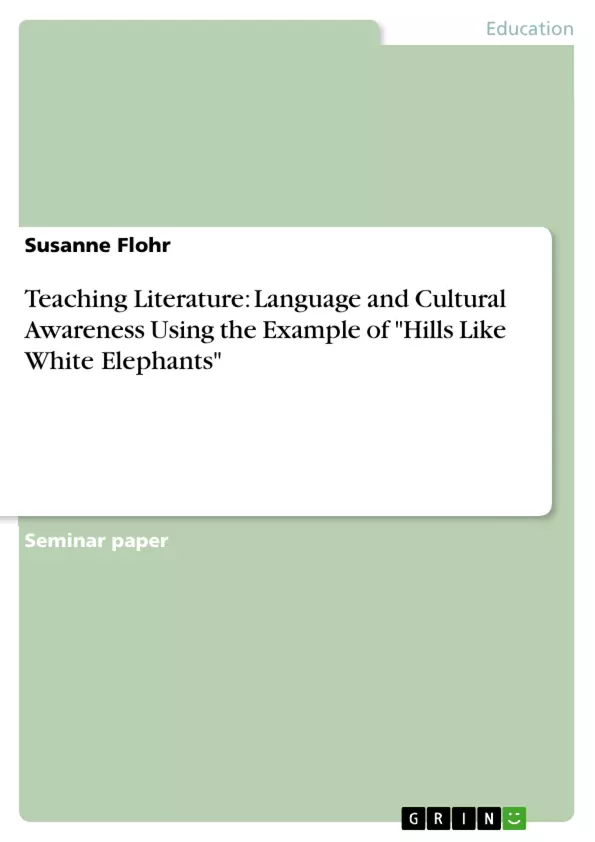This term paper will take several questions into account by starting off with a general definition of the terms ‘Literature, Language and Cultural Awareness’ as they are the basis for talking about literature and literary texts. Afterwards, a precise definition of the terms will follow before the consequences for the EFL classroom will be mentioned which lead to a text example that shows how one can teach the aspects that have been mentioned before and why it is important to teach students literature at all. The text shows that students need to understand other cultural backgrounds in order to understand the whole text since we do not have the expression ‘hills like white elephants’ in Germany. As a result, this text is a good example for showing how important language and cultural awareness are in order to understand literary texts in the EFL classroom. When we talk about literature in the EFL classroom, we should first of all ask ourselves what we need to take into consideration in general when we want to deal with literary texts in the EFL classroom. Some questions arise like why one should teach literature in the EFL classroom and what kind of literature needs to be taught. It is important to read literary texts in the EFL classroom because the curriculum says that teachers should deal with different countries and cultures by presenting people in real life situations. Therefore, they should mostly use authentic material in order to build a connection to the student’s world. The teacher should be careful in choosing texts for the EFL classroom because the texts need to be suitable for the class in order to let the students work with them.
Inhaltsverzeichnis (Table of Contents)
- Introduction
- Definition of ‘Literature, Language and Cultural Awareness’
- Literature
- Language Awareness
- Cultural Awareness
- Consequences for the EFL Classroom
- What can be done with the Short Story?
- Pre-Reading Activities
- While-Reading Activities
- Post-Reading Activities
- Possible Tasks
- Possible Answers
- The Relation of the Story to Language and Cultural Awareness
- Outlook
- References
- Appendix
Zielsetzung und Themenschwerpunkte (Objectives and Key Themes)
This paper aims to explore the interconnectedness of literature, language, and cultural awareness in the English as a Foreign Language (EFL) classroom. It emphasizes the importance of teaching these concepts to students in order to enhance their understanding of literary texts and diverse cultural backgrounds.
- Defining the concepts of literature, language awareness, and cultural awareness in the context of EFL education.
- Examining the implications of these concepts for EFL classroom practice.
- Presenting a text example – “Hills Like White Elephants” – to illustrate how these concepts can be effectively implemented in teaching.
- Highlighting the importance of cultural sensitivity and understanding for interpreting literary texts.
- Exploring the use of pre-reading, while-reading, and post-reading activities to enhance comprehension and engagement with literary texts.
Zusammenfassung der Kapitel (Chapter Summaries)
The paper begins with a general definition of literature, language awareness, and cultural awareness. It then delves into the specific implications of these concepts for EFL classroom practice, emphasizing the need for culturally appropriate and engaging teaching methods. The paper uses the short story “Hills Like White Elephants” as a concrete example, demonstrating how a culturally sensitive approach can lead to a deeper understanding of the text and the characters' perspectives. The author then outlines potential teaching strategies, including pre-reading, while-reading, and post-reading activities, and explores the importance of using authentic materials and facilitating discussions around the texts.
Schlüsselwörter (Keywords)
The core concepts addressed in this paper include literature, language awareness, cultural awareness, EFL teaching, literary competence, cultural sensitivity, authentic materials, and intercultural understanding. The paper specifically examines the role of these concepts in interpreting and teaching literary texts, emphasizing the importance of cultural context in understanding and appreciating literature.
Frequently Asked Questions
How can literature be used to teach cultural awareness?
Literary texts present people in real-life situations across different cultures. By analyzing these, students learn to understand and respect diverse cultural backgrounds.
Why is "Hills Like White Elephants" a good example for EFL classrooms?
The story uses metaphors like "white elephants" that require cultural and linguistic sensitivity to interpret correctly, making it ideal for developing literary competence.
What are pre-reading, while-reading, and post-reading activities?
These are teaching strategies: pre-reading activates prior knowledge, while-reading focuses on comprehension, and post-reading encourages discussion and deeper analysis.
What is "Language Awareness" in literature teaching?
It refers to the students' sensitivity to the nuances of language, style, and metaphors used by authors to convey deeper meanings.
Why should teachers use authentic materials in EFL?
Authentic materials build a stronger connection to the real world and provide students with genuine examples of how language and culture intersect.
- Arbeit zitieren
- Susanne Flohr (Autor:in), 2007, Teaching Literature: Language and Cultural Awareness Using the Example of "Hills Like White Elephants", München, GRIN Verlag, https://www.grin.com/document/142930



